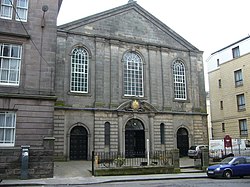FROM: William ...
Dear Father Donald,
Thank you for sharing with me the funeral of Fr Anselm. As Fr Abbot Mark's homily concludes, with his passing and that of Fr Stephen last February a chapter in the life of Nunraw closes - and, as it does - so too the old Abbey closes: I find that very poignant. It is almost as if Fr Anselm's funeral comes to mark the close of an era... and the event coincides with the memorial of the Cistercian Founders.
I suppose matters will be progressing with the transfer of the old Abbey to the new owner. Such finality, cutting the ties with the past.
It is perhaps during the Night Office most of all that these changes find their meaning, in the quietness and the stability of the daily life of the Community, in which the love of God shines in the darkness.
Thus, in much sadness, and yet with confidence in the eternal Providence of God.
With my love in Our Lord,
William
 |
| Fr. Anselm 1947 |
Dear William,
Thank you of the so many interesting Email not yet caught up with.
Today we celebrated the Solemnity of the Citeaux Fathers.
Yesterday we had the unique funeral of the Monk (Nunraw) and Priest (Brentwood Diocese).
Fr. Mark has just sent me the panegyric - thus with the Attachments and maybe the whole story may piece together.
The family shared with us the Album of Pictures in the Refectory later.
God love.
Donald
+ + + + + + +
The Gospel (Luke 12: 35-40) tells us to be ready, to wait patiently for the Lord's coming. I have never known anyone who has waited so patiently to meet his Master as has Fr Eamonn, our Fr Anselm.
For the benefit of those who are not familiar with the details, Fr Eamonn died on 13th December. We were expecting a funeral during the Christmas rush. Then we were told that there would be a delay as it would take another 4 days for official permission to move his remains from England to Scotland. Shortly after that the undertaker phoned to say that there was a further problem as Fr Eamonn had fallen in hospital before he died. There would therefore have to be a post-mortem. With Christmas and the holiday period, weeks went by. The next news was that his body had not yet been returned after the post-mortem. It took another week or so before the death certificate and other documents were obtained and the journey north possible.
I wonder if he would have been allowed some exasperation during that wait. No doubt it increased his desire to be with God.
In the beginning of Nunraw's history, Fr Eamonn, who took his middle name (Anselm) as his monastic name, came over with the very first of the founders from our mother house at Roscrea, Ireland. In the early years at Nunraw he became the first Fr Master of the lay brothers. As the M. C. he had to organise the liturgy for the main ceremonies at the abbey. He was nothing if not meticulous, as can be seen in the chronicles he kept of the ongoing events at Nunraw.
There are photographs of him laying the stonework in the building of the new abbey. There were no end to his talents. He was a gifted carpenter, making, for example, the first of our choir stalls, to which Brother Antony later added in the same style. Anselm seemed to be everywhere producing what was required for the growing numbers in the community in its heyday.
 |
| Fr. Anselm, hewing of stone |
While we were waiting for the return of his remains to Nunraw, the image that kept passing before my eyes was that of a bottle, with its message closed inside, thrown into the sea and left to the whims of the currents. Now, finally, it has come to shore. He has been found and ready for the remaining short distance to his final resting place.
Anselm has been waiting a long time for the Master to come. In the parable in today's gospel, he has been waiting and ready. The Master, as promised, has come. He has put on his apron and ready to set him down at table and to serve him. 'Good and faithful servant' just about sums up the situation. All his contributions to the Nunraw community, all the serving and caring among his parishioners in the diocese of Brentwood, have been recognised and can now be suitably acknowledged by his Lord and Master.

+15+Dec.jpg)











